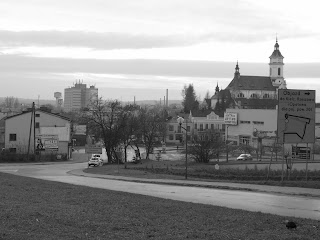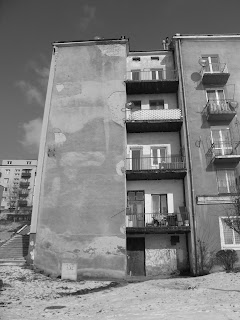It was 1945, and I was about 21. It was April and around my birthday, but not too many Jewish people knew their birthday.
Germany
What was later? After the liberation we lived in something like a camp in Feldafing for a few months. It looked like a camp, but we were free. Once you were free, you could do whatever you want. After a few days, we took a train to Munich. If we didn't have enough bread, we went to a city not far away, and there was a bakery. When they saw us, they gave us a loaf of bread. For free. Why? The Germans knew what they did. They knew we don't have any money, anyway.
Whom did I spend time with? I knew most of the people. A lot of people were from my hometown. But I had really one friend. I used to watch him, as he was smaller than I was. We lived together in Germany for a couple of years, till it appeared he had family in Brazil and he left. And I stayed in Munich for five years.
I remember how I made my first few dollars, some money. We went from Munich to another city, then we went to another, and we got some linen. I took some. You might call it stealing. And from there we went to Italy, I don't remember how, and in Italy, we sold the linen. We went back, and the second time, I took 10 cartons of cigarettes from American soldiers, and I sold them in Italy.
It was easy to go to Italy. You took a train. They asked you: where are you going? You said: to Palestine. It was a good excuse. And to get back to Germany, we walked. We had to walk through Alps. Somehow, I got back to Germany twice. That's how I made my first few dollars. In Bergen-Belsen, after the war, there were Jewish survivors and there used to be a black market there. We used to go there. We bought some stuff, took some train, all night, went to Hamburg, took a bus, and went there, sold some stuff... Well, it was a black market. You bought some marks, some dollars. That's how it started up. I made ten dollars, and it was a lot of money.
Ostrowiec
Why did I come back from Germany to Poland? No, not to search for anybody. I knew that the family was gone.
I went to Poland twice in 1945. I don't even remember if it was winter or summer. I came back to find out what I can do with my father's building. I was waiting in Ostrowiec for the paper that the house belongs to me. And it took a few weeks, at least 6 weeks.
I came back because of the house, but I did not go into it. Why? Oh, people lived there. I was really scared to go in there. (crying) I walked by a few times, but I was afraid to go in.
 |
| 2018. Górzysta Street |
Where did I stay? With a friend, on the Młyńska Street, close to our house, but closer to Aleja. There was another Jewish factory. One of the sons of the owner survived, he was older than I was, and I stayed with him.
I never went back to our house, so I didn't know anything about the leftovers of the factory including the machinery we bought before the war. About a month before the start of the war on, my father made up [an agreement] with a brewery not far from my house. They were supposed to supply beer in barrels and they even sent us machines, to fill the beer into the bottles. But since the war broke out, we didn't do anything with the machines.
After the war in Ostrowiec, there were hardly any Jews. Just a few. They opened the kitchen so that Jewish people could go and get a soup. There was a kitchen for the Jewish people; ladies cooked for us. They opened up a kitchen, just in case somebody come back to Poland. Anybody wanted some food once they came back.
I don't even remember what I did during these 6 weeks that I waited for the paper [about the ownership of the house on Gorzysta St.]. There was a memorial ceremony at the Jewish cemetery. I am not sure exactly when I came to Ostrowiec the second time after the war. I think it was after the Kielce pogrom. Some Jewish people were in Ostrowiec during that time. Not a lot, but some.
Why didn't I stay in Ostrowiec? In Ostrowiec, to stay? Oh no, I couldn't do it. Because of the memories? Yes, too. But I have nothing to do there. The atmosphere wasn't the same. The market... there was no market there. You didn't see anything new. I even met one Gentile, Wowrzek, I remember him as long as I lived as a child. He worked in our soda factory every day. He helped fill up the water tank that was on our roof. While I was at the marketplace in Ostrowiec after the war, I met him once but we didn’t spend a lot of time talking together.
Did I hear about the killing in the Fajga Krongold house? Yes. That's why I didn't stay there.
I am not saying that everybody was against the Jews. But the Poles didn't behave good, really. Even after they knew all the Jews were killed.
Did we get any help from the Polish people? No, no, no, I didn't need anything from them.
 |
| 2018. Ostrowiec |
***
The killing in the Fajga Krongold house - it was a murder committed in Spring 1945. Two young Polish men entered a house where Jewish people stayed and opened a fire.
Four Jewish people were killed and another four injured. These people were Holocaust survivors, all of them were young. Fajga Krongold, Leibl Lustig, Chaja Szpigiel and a 23-year-old woman from Ćmielów were killed, and Hersz Zylberberg, Leon Szpilman, Mania Szpilman and a fourth, unknown person were injured.
Young Polish men were members of a troops of so called cursed soldiers – anti-communist resistance. They entered Krongold's house because they believed she had a list of Polish people who contributed to the death of any Jews during the war and they wanted to take the list from her.
Leon Szpilman, injured, helped to identify attackers, but when he left hospital, he was threatened and intimidated. He and his wife Mania also weren't able to get back their house (a Polish person lived there), and finally they left Ostrowiec forever. (annotation: MP)
More (in Polish):
***
See previous parts:










